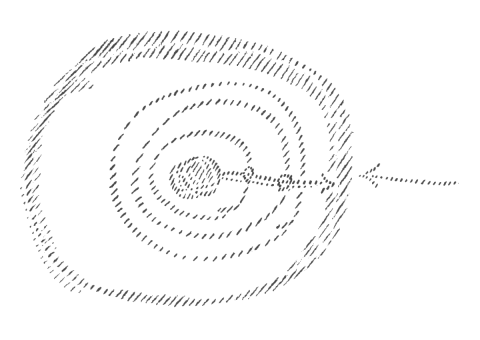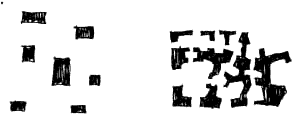Notes from negative space
Negativity. One of my favorite things. Or "making song think" as Rob Kaufman put it on the back of Barbara Guest's Forces of Imagination or Imagination, "Poetry the True Fiction" as Barbara says in the book. How can I whose last book is called Self-Destruction presume to deny that my capability is negative?
I don't see this as a category problem, Kasey, or conflict of isms so much as an assertion and counter assertion of both fragmentary excess and lack of authority. Or A tonally speaking "How low can you go?"
Interesting, even strange, Brent, that we should both have recently come to Badiou independently though we occupy almost exactly the same work space. My reading of Badiou has produced more reverie than conclusion so far, though I am interested in how one experiences and defines the truth event and whether it is elegiable, being always of a practical bent in these matters.
I have a notebook of notes. Here is a passage from one of the introducers, Gabriel Riera:
"The event, therefore, points to the void or inconsistency out of which a situation holds together." And later: "The poem's negative force consists in producing a fragment of truth."
There is a negative space created by the poem of what it does and does not do. In that, there is a suggestion of how to proceed.
Picking up literally the top book on the A tonalist pile by my desk I read (from Alli Warren's "Poem against Monody" in HOUNDS)
Commerce on the prairies
heats a rocket of the day
traitor In a promised land
inventory business parks
and other Open spaces
where ferns grow
Beware of engine references
A bloody head often is a sign
of Empire Down the hall
a perpetually regenerating empiricist
Candies the shoes of upper crusts
A trunkfull of fiddles
A textbook on welding
In the mustard grass
low clouds
yanked from them
hills a premonition
So there is observation, Open space, plain word choice, alacritous word choice, prosodic sophistication, truth suggesting and sex. There is speechiness here but this is no joke. There is love.
In an upcoming review (join SPT to get your copy in their newsletter), Mary Burger points out that Norma Cole's SCOUT "enacts forms of memory that are ways of looking outward, using the past to find new forms of engagement."
You get a nice Duncansian cross-eyedness here. Looking forward and backward while executing a perfect three point engagement.
Norma points out herself:
We attend to each other. Informed by the world, poetry goes back out into the world, and the world returns with the text. Experience and imagination are in a dynamic relationship of gesture -- the body in motion -- between idea and thing. So the body of the poem, its voices and images, fill the space betweeen, for a time.



Negativity. One of my favorite things. Or "making song think" as Rob Kaufman put it on the back of Barbara Guest's Forces of Imagination or Imagination, "Poetry the True Fiction" as Barbara says in the book. How can I whose last book is called Self-Destruction presume to deny that my capability is negative?
I don't see this as a category problem, Kasey, or conflict of isms so much as an assertion and counter assertion of both fragmentary excess and lack of authority. Or A tonally speaking "How low can you go?"
Interesting, even strange, Brent, that we should both have recently come to Badiou independently though we occupy almost exactly the same work space. My reading of Badiou has produced more reverie than conclusion so far, though I am interested in how one experiences and defines the truth event and whether it is elegiable, being always of a practical bent in these matters.
I have a notebook of notes. Here is a passage from one of the introducers, Gabriel Riera:
"The event, therefore, points to the void or inconsistency out of which a situation holds together." And later: "The poem's negative force consists in producing a fragment of truth."
There is a negative space created by the poem of what it does and does not do. In that, there is a suggestion of how to proceed.
Picking up literally the top book on the A tonalist pile by my desk I read (from Alli Warren's "Poem against Monody" in HOUNDS)
Commerce on the prairies
heats a rocket of the day
traitor In a promised land
inventory business parks
and other Open spaces
where ferns grow
Beware of engine references
A bloody head often is a sign
of Empire Down the hall
a perpetually regenerating empiricist
Candies the shoes of upper crusts
A trunkfull of fiddles
A textbook on welding
In the mustard grass
low clouds
yanked from them
hills a premonition
So there is observation, Open space, plain word choice, alacritous word choice, prosodic sophistication, truth suggesting and sex. There is speechiness here but this is no joke. There is love.
In an upcoming review (join SPT to get your copy in their newsletter), Mary Burger points out that Norma Cole's SCOUT "enacts forms of memory that are ways of looking outward, using the past to find new forms of engagement."
You get a nice Duncansian cross-eyedness here. Looking forward and backward while executing a perfect three point engagement.
Norma points out herself:
We attend to each other. Informed by the world, poetry goes back out into the world, and the world returns with the text. Experience and imagination are in a dynamic relationship of gesture -- the body in motion -- between idea and thing. So the body of the poem, its voices and images, fill the space betweeen, for a time.




0 Comments:
Post a Comment
<< Home